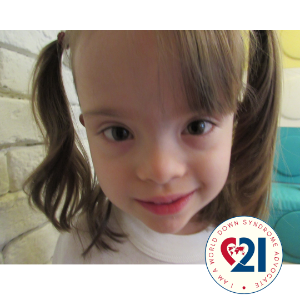A data 21/03 is remembered around the world to raise awareness and uphold the general principles of the United Nations Convention on the Rights of Persons with Disabilities (UN CRPD): “Full and effective participation and inclusion in society”. In everyday life, unfortunately, reality is very distant for people with Down syndrome and for other disabilities, which makes this date so important in the world calendar.
What you need to know about this genetic condition before we move on to this article:
Down Syndrome (or Trisomy 21) is not a disease – It is a genetic alteration produced by the presence of an extra chromosome, the pair 21. Although the cause is unknown, the effects – which can include learning difficulties and certain physical characteristics – vary from person to person. Therefore, it is not correct to say, for example, that a person who has Down syndrome is sick.
The person does not have SD – The most appropriate thing is to say that the person has an intellectual disability. A person can carry (carry or bring) a wallet, an umbrella or even a virus, but cannot carry a disability. Disability is an inherent characteristic of the person, it is not something that can be left at home.
intellectual disability – Intellectual disability is a developmental delay that impacts the way a person learns and interacts with their environment, that is, it is a cognitive impairment that occurs in different ways with each person. In the case of Down syndrome, there are no degrees.
Intellectual disability is different from mental disability – It is important to highlight that intellectual disability is different from mental disability, the latter is a psychological impairment treated as a psychiatric illness.
People with Down syndrome have an opinion – People with Down syndrome study, work and live with everyone. These individuals have an opinion and can express themselves on matters that concern them. Always try to talk to people with disabilities themselves, not just family members, companions or specialists.
People with Down syndrome should not be treated like poor people. – Having a disability is living with some limitations. This does not mean that people with disabilities are “poor things”. People with Down syndrome have fun, study, walk, work, date and become adults like everyone else. Being born with a disability is not a tragedy, nor a disgrace, it is just one of the characteristics of the person.
Now that we have talked a little about the syndrome, I would like to reflect with you about “What does inclusion mean?” a question for the International Down Syndrome Day 2022 that the DSI (Down Syndrome International) is asking people all over the world.
Down syndrome in advertising
Looking from the advertising side, we know that society follows trends and seeks to see itself in the campaigns and brands it consumes. What does inclusion in advertising mean? For me it’s that jargon: “See and be seen”.
As a publicist and mother of a child with Down syndrome, I can say that never has a campaign touched me as deeply as “Every baby is a Johnson baby” produced by Nizan Guanaes at the DM9 agency. May 2017, still with Manu in my belly, I received this gift on my first mother’s day: my baby would be amazing like everyone else, he would be a Johnson baby, regardless of the syndrome. This is so powerful that from then on I keep reflecting that advertising inhabits a very important place in our lives: the place of representation.
For today, I would like to highlight a campaign signed by Africa branch for Itaú – in which the actor Ariel Goldenberg, who has Down syndrome, is inserted without ableism (prejudice against people with disabilities). He participates in a natural way, after all, people with Down syndrome are clients, consumers and citizens. Amazing!
I’ll borrow a phrase from advertising executive Nizan Guanaes to end: “When advertising is advertising, it’s so good that it doesn’t look like advertising, it’s life”.
Inclusion for me is that: natural representation!

CARLA SCHULTZ
AdNews columnist – Diversity and Inclusion.
Advertising, digital influencer (Instagram @caminhoscommanu), speaker, atypical mother of a beautiful girl with Down syndrome, mentor of the Diversity group at NBCUNIVERSAL in Brazil and leader of the affinity group for people with disabilities at Globo.
The post What do we need to deconstruct about Down Syndrome? appeared first on DNAMES.






